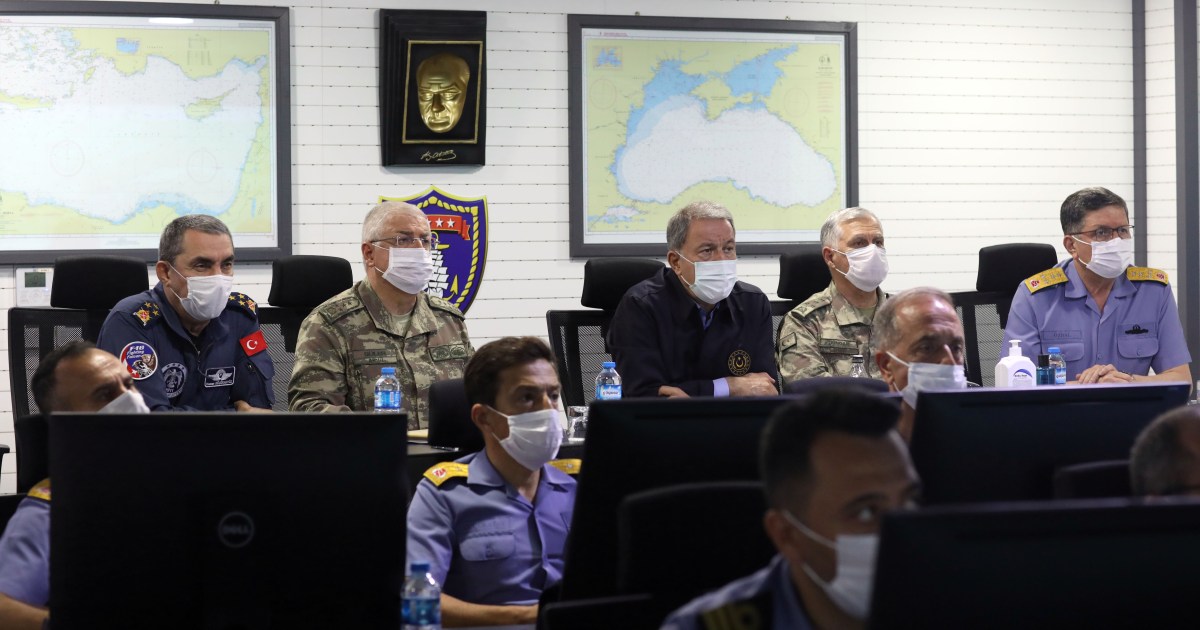Turkish President Recep Tayyip Erdogan affirmed that his country is determined to continue exploration activities for oil and gas in the eastern Mediterranean and will not hesitate to take the necessary response to the slightest harassment, while Greek government circles have expressed their disappointment with the European Union’s handling of developments in that region.
In strongly-worded statements, Erdogan said today, Saturday, during a meeting with members of the ruling Justice and Development Party branch in the northern state of Rize, that Turkey “will not lower its head for revelation in its continental shelf in the eastern Mediterranean, and will not take any step backward in the face of the language of threat and sanctions.”
He added, "Those who excluded Turkey from energy resources in its southern borders through a careful policy 100 years ago will not succeed in achieving this in the eastern Mediterranean."
The Turkish president affirmed that the research vessel "Aruj Reyes" will continue its activities to explore for oil and gas in the eastern Mediterranean, according to its specific mission, until August 23, and "we will never hesitate to take the necessary response if it is subjected to the slightest harassment."
"Just as we tore apart the Treaty of Sevres, which aimed to divide our homeland a century ago, we will protect the blue homeland today with the same firmness." Erdogan affirmed that his country would protect its rights in the eastern Mediterranean and the Aegean Sea "until the end."
Friction of two vessels
These statements came after press reports reported last Wednesday that there had been friction between a Greek and Turkish warship.
Greek officials described what happened as an accident, while Ankara described it as a provocation, and the Turkish president said that his country responded to what happened.
Turkish media said at the time that a Greek frigate called "Lemonos" tried to harass "Aruj Reis," but the Turkish naval forces interfered with the warship "Kamal Reis" and forced the frigate away from the area after it was damaged.
For its part, the Turkish Foreign Ministry said in a tweet on Twitter in response to the European position on the tension in the eastern Mediterranean, that "Turkey supports dialogue and negotiation, and is determined to protect its legitimate rights and interests."
The ministry added that the call launched by the European Union should be directed to those "who take unilateral and escalatory steps, and do not respect the rights of Turkey and the Turkish Cypriots, and not to Turkey."
Turkish warning to France
In the same context, Turkish Defense Minister Hulusi Akar said that the statements of a European ally "have nothing to do with the eastern Mediterranean region, and are coming from thousands of kilometers away" that they will reinforce their military presence in the region "violates the spirit of the alliance and does not serve to solve problems through dialogue." France sent two Rafale planes and a warship to the region.
Akar's speech came during a video interview with Turkish navy personnel in the Aegean Sea and the eastern Mediterranean.
The Turkish minister affirmed that "any intervention against our ships and activities in the eastern Mediterranean region will not be left without a response. We want everyone to know that we are determined and determined to protect our rights and interests in our maritime areas from now on, and do what is necessary and we are able to do so."
Greco-European interactions
The European Union foreign ministers discussed in their meeting on Friday via video the developments in the eastern Mediterranean, and Josep Borrell, the EU's High Commissioner for Foreign Policy, said that the ministers agreed to stand by Greece and Cyprus in the dispute over exploration in the eastern Mediterranean.
The European statement issued by the meeting said that Turkey's maritime movements would lead to "increasing the chances of dangerous events."
They added that the deterioration of relations with Turkey would have wide-ranging strategic consequences for the entire European Union, well beyond the eastern Mediterranean region.
However, government circles in Greece expressed their disappointment with the dealings of a number of European Union countries with developments in the Eastern Mediterranean, as some EU countries criticized the Greek and French steps.
Al-Jazeera correspondent Noureddine Bouziane said from Athens that Greek newspapers expressed this feeling of disappointment, as the Greek officials were looking for a more firm European stance through which the Turks would understand that they would not succeed in "imposing a fait accompli" on Greece.

